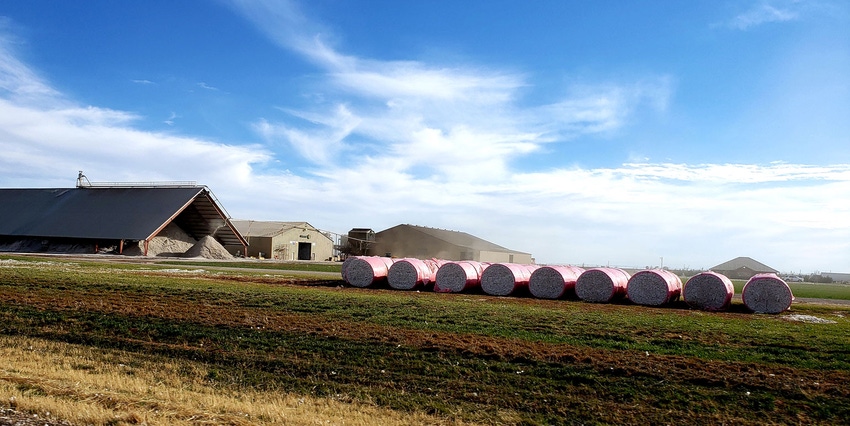
Increased cotton acres, a weather-complicated harvest and expansion created an extended ginning season for several gins in the Southwest.
In Farwell, Texas, Gin Manager Craig Rohrbach, Parmer County Cotton Growers Coop, says increased acres along with not losing any dryland acres and no hail created, “the perfect storm,” for a record-breaking season.
“We had a big run. It was close to 150,000 bales,” says Rohrbach. “That was an all-time record.” In 2017, Parmer County ginned 85,000 bales.
See, Grower credits hail storm for life's blessings
Piggy-backing a record season was a lengthy ginning year. Rohrbach says while they began ginning in October, the last bale wasn’t off the press until the first week of April. Overall, he says the quality of the cotton ginned was good. “When our cotton first opened, the early rains affected some of our leaf grades but in general it was a good quality year.”
Coupled with good grades was high yield. “We had unbelievable yields coming out of our northern territory which is north of I-40. We had some producers average over four bales across their whole farm.”
CARNEGIE
East of Farwell, in Carnegie, Okla., Gin Manager Jeannie Hileman and her crew ginned nearly 120,000 bales. While they ginned a little less than last year, she says they also finished two months earlier than they did in 2018.
To accommodate increasing cotton acres, Carnegie built a new gin throughout the 2017/2018 ginning season, finishing the year with 123,000 bales. While plans are to eventually shut down the old gin, due to a wet harvest, Hileman says they ran both again this year.
“We don’t have to necessarily run both gins all the time but when you have green cotton it’s nice to have two plants,” she says. “Wet cotton doesn’t like to sit in a module very long, so the faster we can get that through the gin the better the grade the producer is going to get.”
A wet harvest not only made things difficult in the field for her producers, but Hileman says it made for a good but difficult year at the gin “I teased my employees and told them they actually had to work for their money this year. There was none of this putting your feet on the console and watching the cotton. You were up on your toes all the time. It changed that much from module to module and from farm to farm. It was definitely a hard ginning year, but all in all it was good.”
See, Field scouts, a “necessity,” for new cotton growers
And though grades were not as phenomenal as they’ve been in the past, Hileman says the great thing about cotton is it’s very forgiving. “Even though it wasn’t a perfect harvest, cotton is still a forgiving crop. As a whole, the grades stood up well.”
Looking ahead, with a good amount of subsoil moisture, Hileman expects a good dryland crop which may in turn increase her acres, along with changes in the market. “Every time the market moves three cents up or three cents down, that’s three changes. But I feel like nothing else is coming in to take its place right now,” she says. “We’ve got the possibility of having a much better dryland crop than we had last year. I think Mother Nature is going to have to help us out but it’s not going to be all on her. I’m preparing for a larger year.”
SOUTHERN KANSAS COTTON GROWERS
North of Carnegie in Anthony, Kansas, and its partnering Winfield location, Southern Kansas Cotton Growers Gin Manager Gary Feist says due to a late start, his gins are still running.
“We got started late this year — too late,” says Feist, who says they began ginning Nov. 20. While an upgrade at Winfield was completed in November, the Anthony location went through a major expansion, doubling its capacity, but delaying the start of the season until January.
While the gins turned out 90,000 bales in 2018, Feist expects about 150,000 bales this year. The two gins, which receive cotton from Oklahoma and Kansas, had ginned 102,432 bales as of April 24.
An early freeze coupled with a late harvest and a lot of rain, reduced the fiber quality, Feist says. Where normally their cotton is a 31.3, this year it’s a 41.
“Our leaf grade is higher than normal, our color is higher and we’ve got pretty heavy bark,” says Feist. “Normally, we have to use 99 percent of our growing season to get our cotton to mature because of where we are at.
“We had a tremendous year this year. We’ve been fortunate this year to finish out this cotton and raise a lot of the top crop — that’s what’s put on a lot of our yield. I bet we’ll have above an 1,100-dryland average, which is pretty good for our area.”
Feist, who’s been the gin manager since the gin was built in 1999, is also chairman of the PCCA Warehouse Committee. He said at a board meeting April 17, PCCA approved to build a warehouse in the Wichita, Kansas, area. “We are having to haul our bales to Liberal, Kansas, Altus, Oklahoma and Sweetwater, Texas. The closest is at least 200 miles away and another 400 miles to Sweetwater. We are excited about this decision.”
About the Author(s)
You May Also Like






